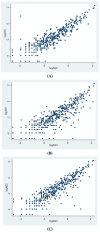Cellular Immune Response to BNT162b2 mRNA COVID-19 Vaccine in a Large Cohort of Healthcare Workers in a Tertiary Care University Hospital
- PMID: 35891194
- PMCID: PMC9316283
- DOI: 10.3390/vaccines10071031
Cellular Immune Response to BNT162b2 mRNA COVID-19 Vaccine in a Large Cohort of Healthcare Workers in a Tertiary Care University Hospital
Abstract
We describe the results of a T-cell immunity evaluation performed after a median elapsed time of 7 months from second-dose BNT162b2 vaccine administration, in a representative sample of 419 subjects from a large cohort of hospital workers. Overall, the Quantiferon SARS-CoV-2 assay detected a responsive pattern in 49.9%, 59.2% and 68.3% of subjects to three different antigenic stimuli from SARS-CoV-2, respectively, with 72.3% of positivity to at least one antigenic stimulus. Potential predictors of cellular response were explored by multivariable analyses; factors associated with positivity to cellular response (to Ag1 antigenic stimulus) were a previous SARS-CoV-2 infection (OR = 4.24, 95% CI 2.34−7.67, p < 0.001), increasing age (per year: OR = 1.03 95% CI 1.01−1.06, p = 0.019 and currently smoking (compared to never smoking) (OR = 1.93, 95% CI 1.11−3.36, p = 0.010). Increasing time interval between vaccine administration and T-cell test was associated with decreasing cellular response (per week of time: OR = 0.94, 95% CI 0.91−0.98, p = 0.003). A blood group A/AB/B (compared to group O) was associated with higher levels of cellular immunity, especially when measured as Ag2 antigenic stimulus. Levels of cellular immunity tended to be lower among subjects that self-reported an autoimmune disorder or an immunodeficiency and among males. Further studies to assess the protective significance of different serological and cellular responses to the vaccine toward the risk of reinfection and the severity of COVID-19 are needed to better understand these findings.
Keywords: SARS-CoV-2; cellular; health care workers; immunity; mRNA vaccination.
Conflict of interest statement
The authors declare no conflict of interest. The funders had no role in the design of the study; in the collection, analyses, or interpretation of data; in the writing of the manuscript, or in the decision to publish the results.
Figures
Similar articles
-
Kinetics and Persistence of the Cellular and Humoral Immune Responses to BNT162b2 mRNA Vaccine in SARS-CoV-2-Naive and -Experienced Subjects: Impact of Booster Dose and Breakthrough Infections.Front Immunol. 2022 May 31;13:863554. doi: 10.3389/fimmu.2022.863554. eCollection 2022. Front Immunol. 2022. PMID: 35711445 Free PMC article.
-
Interferon-gamma release assays outcomes in healthy subjects following BNT162b2 mRNA COVID-19 vaccination.Rheumatol Int. 2022 Mar;42(3):449-456. doi: 10.1007/s00296-022-05091-7. Epub 2022 Jan 20. Rheumatol Int. 2022. PMID: 35059799 Free PMC article.
-
A randomized, double-blind, placebo-controlled phase III clinical trial to evaluate the efficacy and safety of SARS-CoV-2 vaccine (inactivated, Vero cell): a structured summary of a study protocol for a randomised controlled trial.Trials. 2021 Apr 13;22(1):276. doi: 10.1186/s13063-021-05180-1. Trials. 2021. PMID: 33849629 Free PMC article.
-
Healthcare Workers in South Korea Maintain a SARS-CoV-2 Antibody Response Six Months After Receiving a Second Dose of the BNT162b2 mRNA Vaccine.Front Immunol. 2022 Jan 31;13:827306. doi: 10.3389/fimmu.2022.827306. eCollection 2022. Front Immunol. 2022. PMID: 35173736 Free PMC article.
-
Immunogenicity and safety of a booster dose of a self-amplifying RNA COVID-19 vaccine (ARCT-154) versus BNT162b2 mRNA COVID-19 vaccine: a double-blind, multicentre, randomised, controlled, phase 3, non-inferiority trial.Lancet Infect Dis. 2024 Apr;24(4):351-360. doi: 10.1016/S1473-3099(23)00650-3. Epub 2023 Dec 20. Lancet Infect Dis. 2024. PMID: 38141632 Clinical Trial.
Cited by
-
QuantiFERON SARS-CoV-2 assay for the evaluation of cellular immunity after immunization with mRNA SARS-CoV-2 vaccines: a systematic review and meta-analysis.Immunol Res. 2024 Dec 27;73(1):25. doi: 10.1007/s12026-024-09570-w. Immunol Res. 2024. PMID: 39729138
-
A longitudinal analysis of humoral, T cellular response and influencing factors in a cohort of healthcare workers: Implications for personalized SARS-CoV-2 vaccination strategies.Front Immunol. 2023 Mar 14;14:1130802. doi: 10.3389/fimmu.2023.1130802. eCollection 2023. Front Immunol. 2023. PMID: 36999012 Free PMC article.
-
Efficacy, Immunogenicity, and Safety of COVID-19 Vaccines in Patients with Autoimmune Diseases: A Systematic Review and Meta-Analysis.Vaccines (Basel). 2023 Sep 4;11(9):1456. doi: 10.3390/vaccines11091456. Vaccines (Basel). 2023. PMID: 37766132 Free PMC article. Review.
-
Evaluation of T cell responses with the QuantiFERON SARS-CoV-2 assay in individuals with 3 doses of BNT162b2 vaccine, SARS-CoV-2 infection, or hybrid immunity.Diagn Microbiol Infect Dis. 2023 Jul;106(3):115948. doi: 10.1016/j.diagmicrobio.2023.115948. Epub 2023 Mar 30. Diagn Microbiol Infect Dis. 2023. PMID: 37094435 Free PMC article.
-
Cellular Immunity of SARS-CoV-2 in the Borriana COVID-19 Cohort: A Nested Case-Control Study.Epidemiologia (Basel). 2024 Apr 10;5(2):167-186. doi: 10.3390/epidemiologia5020012. Epidemiologia (Basel). 2024. PMID: 38651389 Free PMC article.
References
-
- Sahin U., Muik A., Vogler I., Derhovanessian E., Kranz L.M., Vormehr M., Quandt J., Bidmon N., Ulges A., Baum A., et al. BNT162b2 induces SARS-CoV-2-neutralising antibodies and T cells in humans. Infectious diseases (except HIV/AIDS) medRxiv. 2020 doi: 10.1101/2020.12.09.20245175. - DOI
-
- Moderbacher C.R., Ramirez S.I., Dan J.M., Grifoni A., Hastie K.M., Weiskopf D., Belanger S., Abbott R.K., Kim C., Choi J., et al. Antigen-specific adaptive immunity to SARS-CoV-2 in acute COVID-19 and associations with age and disease severity. Cell. 2020;183:996–1012.e19. doi: 10.1016/j.cell.2020.09.038. - DOI - PMC - PubMed
Grants and funding
LinkOut - more resources
Full Text Sources
Miscellaneous


